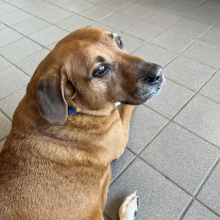FDA approves Cornell stem cell trial for dogs and horses
The FDA has approved clinical trials that will explore the use of stem cells to treat musculoskeletal and neurological abnormalities in dogs and horses at the Cornell University Hospital for Animals (CUHA), making it a leader in veterinary regenerative medicine research.
Co-PIs on the trial are Christopher Frye, D.V.M. ’11, associate professor and section chief of the Sports Medicine and Rehabilitation Service, who will lead the canine component, and Dr. Aimee Colbath, assistant professor in the Section of Large Animal Orthopedic Surgery, who will lead the equine component.
“Our clinical trial aims to track the efficacy and safety of stem cell therapies used to treat a variety of nerve and musculoskeletal conditions,” Frye said.
Stem cells have the potential to help heal tissue, mediate inflammation and/or reduce pain. They may hone to damage tissue, modify their environment through cell signaling and immune system interactions.
“The ultimate goal is to help animals recover from injuries more completely, and to reduce discomfort,” Colbath said.
Volunteers with eligible animals will work with Frye and Colbath on the best way to collect that animal’s stem cells for use on their own injuries. Dogs or horses suffering from common conditions like osteoarthritis, tendinopathy, hip and elbow dysplasia or nerve pain are potential treatment candidates, as well as those with general related nerve, bone, joint or muscle issues.
This clinical trial is part of a long-term study entitled, “The use of autologous or allogeneic adipose (ad-MSC) or bone-marrow (bm-MSC) derived mesenchymal stem cells for canine musculoskeletal and nervous disease,” which will track the extraction of stem cells from the patient’s own fat or bone marrow, and then used to treat muscle, bone and nerve conditions. FDA-approved clinical trials must meet strict criteria and require a close ongoing relationship between the investigating institution and the FDA.
Sharon Roehm’s golden retriever Molly was one of the first dogs to come to CUHA for stem cell and platelet-rich plasma therapy, used to increase Molly’s mobility and help ameliorate pain from elbow dysplasia and osteoarthritis. “Molly is now eight and a half years old, was diagnosed at 14 months and is still an active, happy golden retriever,” Roehm said. Molly’s treatment plan has evolved with her condition. She comes to CUHA every four months, stays overnight to ensure pain control and goes home the next morning. She also does rehabilitation therapy twice a week at home. “Without Chris Frye and his fantastic team, I’m not sure that Molly would be able to live the normal, comfortable life that she enjoys. She adds so much joy to our family!” Roehm said.
Tiffany Amalfi also brings her mixed breed dog Maximus from Rochester to CUHA to be treated for his elbow dysplasia and osteoarthritis. “At the beginning of our journey, we treated Max with anti-inflammatory and pain medication, but once his dysplasia started to affect his quality of life, we started platelet-rich plasma,” Amalfi said. Maximus is an active nine-year-old who loves to run and play. “Max is a runner and we’ve always referred to him as a circus dog. He can jump over six feet in the air, and after his stem cell therapy, he goes right back to his zoomies, razing, juking, jumping playful self,” Amalfi said, adding that she appreciates Frye’s “realistic and truthful” bedside manner. “I never once felt pressured to move forward with stem cells — only informed and confident we were doing what was best for our amazing boy!”
Hattie Ruttenberg brought her horse Leo to CUHA for treatment after the Oldenburg schoolmaster sustained a soft tissue injury. Experts at CUHA, including Michelle Delco, Ph.D. ’16, the Harry M. Zweig Assistant Research Professor, proposed giving Leo a series of stem cell and platelet lysate injections. “After a series of three injections and carefully managed rehab, Leo is again sound and back to work,” Ruttenberg said. “At some points in this process, the question was simply whether he could be made comfortable enough to be turned out and retired. He was visibly lame at the walk. We consulted with a number of specialists before getting to Dr. Delco. No one else had been able to figure out exactly what was wrong, let alone come up with a plan that returned Leo to soundness and happy work.”
Cornell has a tradition of veterinary stem cell research, particularly in musculoskeletal disorders. The information gained in this study has the potential to affect considerations for human medicine, as dogs and people share many of the same musculoskeletal diseases and live in the same environments.
Interested dog and horse owners can learn more and how to sign up through the clinical trial listing on the Cornell University Hospital for Animals webpage.
Written by Melanie Greaver Cordova






